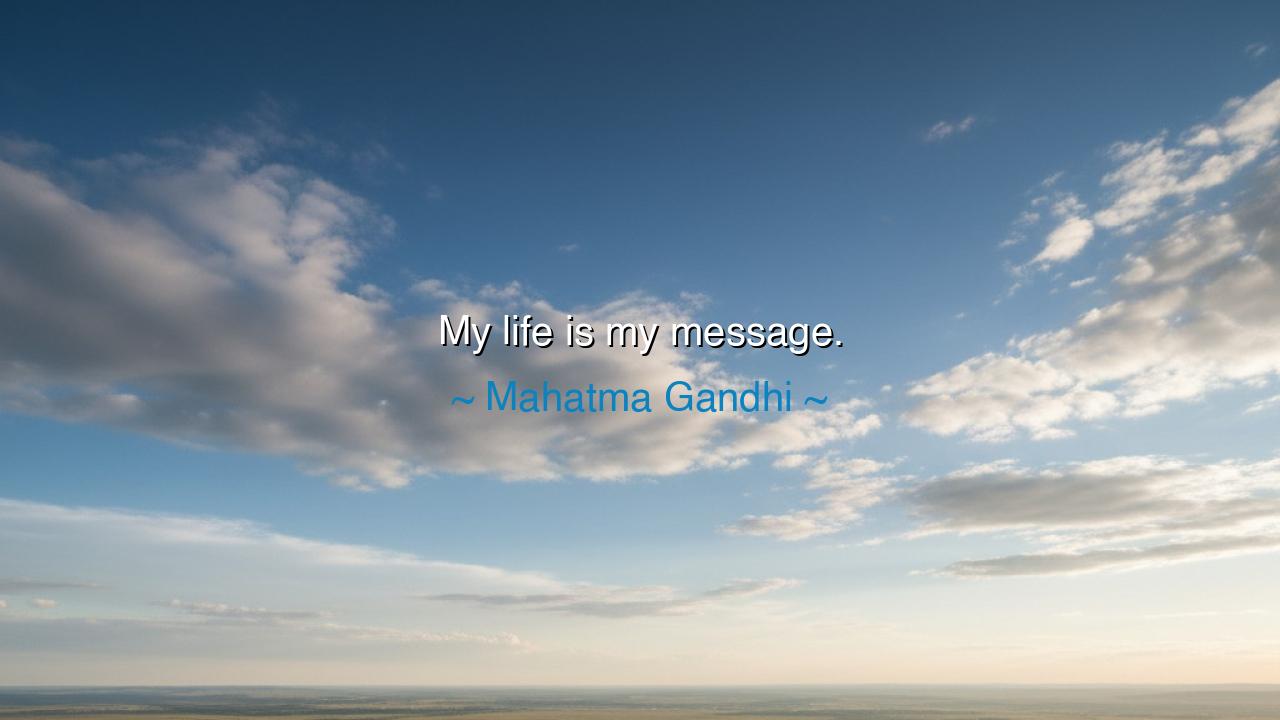
My life is my message.






"My life is my message." These words, spoken by the great Mahatma Gandhi, resonate across the ages, reverberating with the power of simplicity and truth. For Gandhi, the essence of life was not in grand speeches or magnificent deeds, but in the way one lives—how one walks through the world, treats others, and stands firm in the face of adversity. In this profound declaration, he teaches us that our actions speak louder than any words we might utter, and that the message we impart to the world is the life we lead.
To understand the full weight of Gandhi's words, let us first reflect on his journey—a journey that was not marked by titles or triumphs of wealth, but by a steadfast commitment to truth and non-violence. He did not seek fame or recognition, but rather a world where humanity could live in harmony, free from the chains of oppression. His life, with its humble beginnings and long path of suffering, was a beacon of hope for millions who sought justice. In every step, every action, Gandhi demonstrated that a life devoted to service to others was the greatest message of all.
History bears witness to the profound impact of Gandhi’s life. The Salt March, a bold act of defiance against the British colonial rulers, is a testament to his belief in the power of nonviolent resistance. For thirty days, Gandhi led a group of followers across the harsh terrain, not with weapons or force, but with conviction and purpose. They were not merely marching for salt; they were marching for freedom, for dignity, for the right to self-determination. This simple yet powerful act of protest carried a message that would resonate long after the march ended—that change does not come through violence, but through the power of truth and non-violent action.
Gandhi's message was not confined to the pages of history. It continues to inspire leaders and activists around the world. In the civil rights movement in the United States, Dr. Martin Luther King Jr. drew directly from Gandhi’s philosophy of non-violence, using it to challenge racial inequality. King’s words echoed Gandhi’s, as he too believed that a life lived in the service of others—through love, sacrifice, and peace—was the truest form of protest and the most powerful force for change. The message, carried through the actions of one man, transcended borders and found a home in the hearts of people from all walks of life.
It is said that the greatness of a person lies not in what they accomplish, but in the lasting impact they leave on the world. Gandhi's life was the embodiment of this idea. Through his actions, he taught that it is not enough to speak of peace or love—one must live it, embody it, and make it the guiding force of one’s existence. His life was his message, a living testament to the power of standing up for what is right, regardless of the odds, and treating others with dignity and respect.
The lesson from Gandhi’s life is clear: our true legacy is not defined by the titles we hold or the wealth we accumulate, but by how we live and the values we hold dear. Integrity, humility, compassion, and service to others—these are the qualities that form the message of a life well lived. Each of us has the ability to live our message, to shape the world with our actions, to leave behind a trail of kindness and wisdom for future generations to follow.
In our own lives, we must ask ourselves: What is the message that we are sending to the world? Are we living in alignment with our values and principles? Every action we take, every word we speak, is an opportunity to impart a message. Let your life be your message, as Gandhi said—live with purpose, serve others, and walk with unwavering integrity. In doing so, we not only change the world around us but also inspire others to follow the path of truth, justice, and peace. And thus, the message of our life becomes a light that shines long after we are gone, illuminating the path for others to follow.






AAdministratorAdministrator
Welcome, honored guests. Please leave a comment, we will respond soon